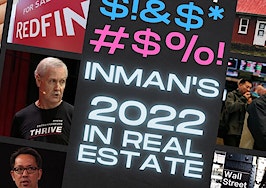New markets require new approaches and tactics. Experts and industry leaders take the stage at Inman Connect New York in January to help navigate the market shift — and prepare for the next one. Meet the moment and join us. Register here.
In When Harry Met Sally, Billy Crystal’s Harry Burns had a number of personality quirks, one being his habit of reading the end of a book before the beginning.
In case he died in the middle, he’d know how it ended.
If we could’ve read the final chapter of 2022 last year at this time, we would likely have not been so bullish on cryptocurrency, been a little more optimistic about Zillow and likely saved a few more commission checks.
But don’t beat yourself up too much; It was an odd year. And remember, what’s past is prologue.
Let’s see what 2022 can teach us about 2023. Here’s the year in the proptech.
Zillow: Still top of mind

Credit: Zillow 3D Home
Inman founder Brad Inman wrote that Zillow’s acquisition of a listing marketing company, VRX Media, proved that once again, the company always seems to make the right moves even after a few bad ones. The aftershocks of Zillow closing its iBuyer shop, Zillow Offers, reverberated well into 2022 finally wrapping up in November.
As that happened, a more realized vision formed for the new Zillow, a “super app” of consumer services and agent products aimed to offer more than an advertising platform for lead-needing agents — much more.
While Premier Agent is still core to Zillow’s revenue stream, the company is busy creating products for the rest of the industry. In its ongoing effort to master consumer home search, the portal announced its pairing with an array of tools for agents, such as free, interactive floor plans blended with immersive virtual tours through Zillow 3D Home.
Summer saw the launch of ShowingTime+, the listing content marketing outgrowth of Zillow’s controversial acquisition of the popular showing management software.
ShowingTime+ will house and empower ShowingTime, Bridge Interactive, dotloop and Zillow’s Rich Media Experience team, its Senior Vice President Jun Choo told Inman. Listing Media Services has been announced, and later in 2023, something called Listing Showcase will debut.
Zillow’s President Susan Daimler made it clear that the company wants to engage in the collective effort to better the real estate transaction and work hand-in-hand with agents and consumers to get there.
The company announced “Zillow 2.0” back in 2019, but its realization was hard to picture then, not fleshed out. As Inman implied in his op-ed, what’s happening now is not an evolution, it’s another metamorphosis.
“The transactional phase of a real estate transformation is unfolding before our eyes,” he said.
Remember when Zillow was just a listing portal?
Key Stories:
Homebuyers have appetite for down payment assistance info, Zillow says
Opendoor is where Zillow Offers was a year ago: Mike DelPrete
Zillow accused of ‘wiretapping’ homebuyers’ visits to its website
Zillow’s new take on listing photos: The Real Word
CoStar cuts 100 jobs amid Homes.com restructuring
Zillow sees Q3 revenue dip, but manages to significantly trim losses
Zillow lays off 300 workers as portal pivots from iBuying to ‘super app’
iBuyers: Is it 2023 yet?

Credit: Flo Pappert
Queue the sad trombone.
IBuying has had better years, but it isn’t dead.
Zillow Offers is done and Redfin Now is now Redfin never. Autumn wasn’t kind, as Opendoor reported a nearly $1 billion loss in November, and Offerpad’s stock fell like ripe chestnuts, not seeing the $1 mark since Oct. 26. The company reported that revenue for Q3 was higher than expected, though, jumping more than 50 percent.
IBuyers are not ultimately proptech companies, but the segment’s initial intent was to remove friction —and agents— from the transaction, relying on technologies like virtual tours and algorithmic home valuations to advance the relationship. The category’s abrupt change to incorporate agents was ultimately the first sign of the model’s inherent flaws.
The iBuyer rise was symbolic of the digital evolution of the deal, a byproduct of how technology is being used to improve the homebuyer and seller experience, which is definitely needed.
The trend gave rise to the idea that homes can be bought and sold in new ways. I don’t think we’d have Power Buyers or the array of alternative financing companies without them. We wouldn’t have cool offer analysis companies like Zavvie, Zoodealio and WyzeGyde, or the plethora (too many to list) of technology companies that include offer management and comparison features for buyers.
Who knows what will happen to this segment in the coming months.
Maybe a build-to-rent fund will scoop up Opendoor, or maybe OfferPad’s revenue bump is a sign of things to come.
For now, let’s stick with what we know: iBuying is down, but not out. The industry has more options, and that’s good.
Key Stories:
Homeward CEO Tim Heyl and the path forward for power buyers
Opendoor faces ‘existential’ crisis as iBuying fights for survival
With Zillow out of the picture, share of iBuyer purchases takes a hit
iBuyer survey reveals how much less sellers would accept for their homes
How iBuyers, Power Buyers can be a Cinderella story for homebuyers
Lower launches ‘Realtor agnostic’ cash-offer service, MortgagePass
RentTech’s Maturation

Credit: RentSpree; Craig Rowe
The rental industry was booming as the year began, bolstered by a 24-month, coronavirus pandemic-backed homebuying craze. Come third quarter, rent’s red-hot summer started to cool.
All that rent money surging into landlord accounts had to be put to work, and a number of technology companies emerged and expanded to provide that opportunity.
Agents and landlords were pitched products serving a number of renttech categories, including, single-family rental investors, short-term rental owners, investors in short-term rentals, mid-size rental community owners, workforce housing rentals and institutional landlords.
Zumper scaled up quickly as the market spiked but found itself having to let go of staff as rents cooled. It remains on solid footing.
RentSpree received $17.3 million in funding this fall and took a hard stance on how residential sales agents should interact with renters, resulting in its technology ending up in multiple listing services around the country.
Rental Beast crafted a member-access deal with the National Association of Realtors after it also closed deals with some MLSs.
Additionally, Redfin chose to integrate rental data from RentPath with its home search results, a company it acquired in 2021.
The rental industry has long been in need of consumer innovations and improved landlord business processes. Paper checks and Excel spreadsheets of per-unit inventory are no way to keep pace with today’s market.
Keep an eye on the trend of guaranteed rent, a practice by which hard-to-define, tech-adjacent, alt-fintechs pay landlords’ rent rolls and then seek payouts from tenants. This often involves tenants joining reward programs that provide bank accounts and credit vehicles. There’s some serious consumer debt risk hiding in this niche, and these firms entered the atmosphere at a more regular pace in 2022 as a result of apartments becoming more expensive to live in, own and manage.
Key Stories:
RentSpree, C.A.R. to offer rental management courses for agents
Rentals are a bright spot amid a widespread slowdown. Can it last?
Housing is so rough, even this Congressman can’t score a home
As investors eye deals on rentals, Lennar offers thousands of homes
Knock knock: DoorLoop launches web portal solution for landlords
JPMorgan rolls out its own property management platform
Fintech Stake rolls out program for landlords to help struggling tenants
Welcome to the Enterprise

Credit: Canva, Craig Rowe
Three well-known proptechs separated themselves this year by focusing on enterprise relationships, business jargon for custom partnerships with entire companies, not merely individual agents or offices.
Inside Real Estate, Chime and Lone Wolf each have a number of solid individual products in their respective arsenals and have so for years. This year, however, the companies seemed to congeal under the notion that they can best serve the industry by entrenching themselves with long-term, high-touch brokerage deals.
Inside Real Estate started the year with a major JPAR partnership. A month later, in March, NextHome named Inside Real Estate a primary technology partner, hiring them to provide its kvCORE Platform to more than 575 franchised locations and 5,200 licensed professionals.
Reaching maturity this year, and likely central to Inside Real Estate’s enterprise pitch going forward, is CORE Home, a broad, multi-faceted solution that uses a number of smart approaches for keeping the homeowner attached to their agent.
The company can roll this out as a white-labeled solution, augmenting the sense of ownership and further overlapping software with internal business practices.
Chime formally announced its enterprise option in April. Known for its nimble customer relationship management software and marketing automation tools, the Chime Enterprise Platform will adapt to each client’s overarching operation and internal office structure.
Chime launched as an integration-friendly CRM in 2016. It’s much more than that now, recently becoming the software partner of choice for fast-growing Real Brokerage, a company already well-versed in how to leverage technology.
Confidential sources told Inman that Lone Wolf entered 2022 still juggling ideas on what to do with, or best integrate, the five companies it bought in 2021.
In June, it revamped the zipForms edition of its Transactions product. Customers of Lone Wolf will be happy to see all kinds of new functionality making it easier to manage deals.
Two months before landing an enterprise deal with Howard Hannah, Lone Wolf announced a major partnership with The Keyes Company from the stage at NAR NXT. It also unveiled a managed lead generation product Leads+, giving brokers another carrot to dangle in front of potential new agents.
Speaking of getting good agents, all three: Chime, Lone Wolf and Inside Real Estate released new or strengthened recruiting tools this year, the latter doing so by acquiring AmpStats, a technology company in the business of recruiting and coaching.
The ability of these firms to gain traction in the enterprise space has something — likely quite a bit — to do with independent brokerages wanting to compete with legacy brands who build and heavily advertise internal technology efforts, such as Compass and Keller Williams.
Multiple enterprise software options are good for the industry. It represents maturity, for starters.
Together, they help create a common baseline of comparison for agents when considering a brokerage move, they create competition that elevates product quality and they produce more prominent voices during eras of change. Working within an enterprise system also helps employees build skills and hiring attributes. Team leaders who know the ins and outs of a product’s recruiting tools, email campaign builders or transaction modules immediately become attractive hires to other companies using them, such as a graphic designer knowing Adobe Illustrator.
A technology company with 10,000 agent users can learn more about how its customers work, how the business at large is evolving and how best to serve buyers and sellers. That expertise will trickle down.
You may not have noticed this trend or even work with these three companies. But their collective presence will continue to have a big but slow-moving impact on proptech.
Key Stories:
5 insights on what’s next for real estate technology
Anywhere names ex-Microsoft exec as first-ever chief product officer
Keyes Company, Revive partner to boost listing business
Weichert chooses SkySlope to power transactions for ‘competitive’ edge
Windermere debuts zavvie-powered comparison tool for sellers
LeadingRE brokerages get boost with Maxa Designs partnership
Signs of maturity in MLSs

National Association of Realtors’ Board of Directors meeting at the Hyatt Regency in Orlando, Florida, on Nov. 14
Back in October 2021 at Inman Connect Las Vegas, a collection of multiple listing service executives chatted about the state of their organizations’ technology.
Change is needed, they said.
Tim Dain, a vice president at Remine, told the audience a part of the problem is a lack of internal technology expertise.
He went on to note that of the many hundreds of MLSs in the U.S. right now, only 10 or so actually have tech developers on staff. And problems in the world of MLS technology don’t always get addressed when they should.
“As an MLS executive, my experience is we don’t solve technology problems until they become political problems,” Dain said.
Abhinav Gupta was also there in 2021. He’s the head of digital product management and strategy for Bright MLS, the industry’s second largest.
For his part, Inman reported, Gupta agreed that there was an opportunity for the industry’s technology to evolve. And he noted that Bright MLS — which is both one of the largest MLSs in the U.S. as well as being heavily invested in technology — wants to be at the forefront of pushing the industry forward.
It took a few months, but in 2022 Bright followed up on Gupta’s wish by hiring the first chief data officer at an MLS, Thomas Morgan.
Bright spokesperson Christy Reap told Inman, “MLSs have traditionally focused on listings. Bright is continuing a path to evaluate the entire home buying experience, not just listings management, and support subscribers with product features that allow them to be competitive across the entire journey.”
Bright will be partnering with others of its ilk, “in a variety of ventures,” Reap also said.
And by “others,” Bright means California Regional MLS, the nation’s largest listing service. The organizations shook hands in February on developing new technology products.
“We are entering this agreement so that we can accelerate the speed at which we develop and launch solutions for our subscribers, and eventually possibly to other MLSs.”
California Regional is already underway, thanks to the 2022 launch of the first-ever MLS-owned venture fund, Venture MLS.
With $10 million at its disposal, the fund has invested in real estate data platform Perchwell, real estate artificial intelligence firm Styldod and real estate marketing firm SavvyCard.
“Venture MLS is committed to developing leading new companies who will be on the cutting edge of innovation,” Venture MLS fund manager and CRMLS CEO Art Carter told Inman.
Helping Venture in developing those new companies will be another notable hire, proptech consultant Jeff Turner.
Bright and CRMLS are finally, it seems, flexing their talent and financial muscles on behalf of change. But it’s not only the big guns doing so.
Inman reported in June on MLS regionalization, smaller MLSs cooperating with others to bridge geographical and philosophical gaps in business.
Many MLSs were formed as an extension of their local associations. While those associations still perform in-person services — making a smaller service area desirable — the physical location doesn’t apply in the same way to digital access to listing data.
According to Jeremy Crawford, president and CEO at First MLS, larger MLSs are more efficient, allowing them to leverage economies of scale, but smaller MLSs can be mightier together.
Crawford sees regional MLSs as a net positive for the broker and agent who no longer have to join multiple associations to do business in a region and thus be subject to different rules, data standards and technology requirements.
There’s no doubt that the stigma of MLSs lacking industry foresight (the impact of portals) and business acumen (no collective response to ShowingTime’s acquisition) to respond to consumer trends have been earned. Today, NAR remains locked in battle to prove the value of the MLS’s ultimate intent, financial cooperation among brokers.
It seems that 2022 was the year that a few MLSs chose to take matters into their own platforms. They now have the money, influence and hopefully soon, enough in-house expertise to have a measurable impact.
Key Stories:
NAR venture capital arm launches tech accelerator in Latin America
NAR passes proposals to encourage MLS data sharing statewide
NorthstarMLS chooses industry veteran as new CEO
Nation’s 2 largest multiple listing services ink massive tech deal
Outdated MLS policy hides thousands of homes for sale
The PLS to Supreme Court: Deny NAR petition in pocket listing suit
Ocusell launches with goal to heal MLS, tech vendor relationships
What haunts MLS leaders? Politics, commissions and their own demise
Proptech funding continues

Credit: AJ Canaria of MoxiWorks
Asked why proptech is now such a priority for venture and institutional capital, a Fifth Wall Ventures executive said in an interview with Inman that it comes down to a few reasons, but maturity in the space is likely the most critical.
“There’s a lot of capital flowing into the space, a lot of companies have been around for quite some time,” co-founder and managing partner Brendan Wallace said. “There are more mature businesses that can become consolidators, that can drive M&A in the space, the landscape has become more sophisticated, and more nuanced. That was not the case when we started.”
One of those signs of maturity can be found in this year’s trend of enterprise deals.
Fifth Wall finished 2022 on a high note, a record-setting high note.
The company closed in December on the largest venture fund ever designated for proptech, $866 million.
Despite that, venture funding for proptechs was down this year. The Center for Real Estate Technology and Innovation’s (CRETI) 2022 Proptech Venture Capital report found that venture capital-backed proptech companies raised $19.8 billion, down 38 percent from 2021.
“On a positive note, deals are getting executed more diligently, leaving plenty of capital available. Founder-entrepreneurs capable of putting together compelling business and revenue models will continue to raise money, even in a tightening market, with a focus on scale, retention, and customer acquisition,” CRETI said.
At Inman Connect Las Vegas in August, Era Ventures managing partner Clelia Peters said much the same, noting that 2021 was the end of a boom period in venture funds raised, so, logically, 2022 would see less.
“And we have more venture capital funds, and those funds are better capitalized than they have ever been, and that capital is going to need to be deployed,” she said.
Almost all sectors of the category found money in 2022, despite the consumer real estate market stumbling over high-interest rates and runaway inflation. The fourth quarter was especially active.
In December, home lending technology company Setpoint closed on a Series A round of $43 million. Landis, a rent-to-own startup, received $40 million in a Series B round in November. BidMyListing, a unique, qualified listing lead model was funded to $15 million in October and in September, DoorLoop raised $20 million.
Perhaps the most surprising proptech raise this year came in August, on the heels of the storied collapse of WeWork. Its enigmatic founder Adam Neumann, without laurels to rest on, launched Flow, a marketplace for branded, high-touch rental properties. Andreessen Horowitz backed him with $350 million.
In less controversial funding news, agent-consumer matching solution HomeLight closed on $115 million, while acquiring cash offer provider Accept.inc.
Money was raised for software supporting each stage of the deal, from down payment savings to wire fraud protection to relocation management.
No doubt, 2022 stuffed a lot of stockings.
Key Stories:
MoveEasy raises $7M funding round
Real estate funding startup Setpoint rakes in $43M in Series A round
CertifID locks down $12.5M Series A funds for rising wire fraud battle
DwellWell, a buyer-agent matching solution, raises $4.5M seed round
Haven scores $8M Series A to help mortgage servicers cross market
Investor interest in real estate tech is beginning to wane, new study says
It’s OK if your business primarily looked inward throughout 2022, hoping to keep staff and productive agents on board while battling the markets. Come spring 2023, when inflation has been down a full quarter and rate news is less volatile, know that you’ll wake to a technology industry better prepared to serve you.
Provided they don’t mess it up.













